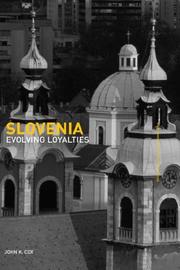| Listing 1 - 10 of 18 | << page >> |
Sort by
|

ISBN: 0415274311 Year: 2005 Volume: 18 Publisher: London ; New York Routledge
Abstract | Keywords | Export | Availability | Bookmark
 Loading...
Loading...Choose an application
- Reference Manager
- EndNote
- RefWorks (Direct export to RefWorks)
Slovenia --- Slovénie --- History --- Foreign relations --- Politics and government --- Histoire --- Relations extérieures --- Politique et gouvernement --- SlovénieHistory --- Slovénie --- Relations extérieures --- Foreign relations.

ISBN: 0313312907 Year: 2002 Publisher: London Greenwood
Abstract | Keywords | Export | Availability | Bookmark
 Loading...
Loading...Choose an application
- Reference Manager
- EndNote
- RefWorks (Direct export to RefWorks)

ISBN: 1134478984 1280177527 020349671X 9780203496718 9780415274319 0415274311 9786610177523 661017752X 9781134478934 1134478933 9781134478972 1134478976 9781134478989 9780415543538 0415543533 9780415543538 9781280177521 9531786437 Year: 2005 Publisher: London New York Routledge
Abstract | Keywords | Export | Availability | Bookmark
 Loading...
Loading...Choose an application
- Reference Manager
- EndNote
- RefWorks (Direct export to RefWorks)
A clear and concise introduction to contemporary Slovenia. It examines the country's rapid transition from a collection of provinces in the southern part of the Habsburg Empire, to a republic within Yugoslavia, to an independent state and analyzes the major political and economic developments since 1991. The perfect introduction to one of Europe's most fascinating nations.
Book
ISBN: 6155211655 1441618120 9781441618122 9786155211652 9789639776418 9639776416 Year: 2009 Publisher: Budapest New York
Abstract | Keywords | Export | Availability | Bookmark
 Loading...
Loading...Choose an application
- Reference Manager
- EndNote
- RefWorks (Direct export to RefWorks)
The novel Martin Kačur, which dates from 1907, tells the engrossing story of a young schoolteacher who moves from one provincial Slovene town to the next, trying to enlighten his countrymen and countrywomen but instead receiving only the mistrust and scorn of the traditional-minded and petty population. The novel is ruthless in its analysis and self-analysis of the failure of this abstract idealist. Brilliant descriptions of Slovenia’s natural beauty alternate with the haze of alcoholic despair, rural violence, marital alienation, and the death of a young and beloved child. The Slovene prose writer, poet, and dramatist Cankar’s characterizations of duplicitous political and religious leaders (the village priest, the mayor, other teachers, doctors, etc.) and the treacherous social scene are remarkable in their engaging clarity. No doubt the raw emotional impact of Martin Kačur derives partly from Cankar’s portrayal of the way society isolates people, denying them sympathy and solidarity. Cankar's style here owes a debt both to naturalism and to symbolism and contains, in its sometimes frantic pace and associative interior monologues, hints of early expressionism.
Cankar, Ivan, --- T︠S︡ankar, Ivan, --- Цанкар, Иван, --- Slovenia --- Eslovènia --- L.R.S. (Ljudska republika Slovenija) --- Ljudska republika Slovenija --- LRS (Ljudska republika Slovenija) --- People's Republic of Slovenia --- Republic of Slovenia --- Republika Slovenija --- S.R.S. (Socijalistička Republika Slovenija) --- S.R. Slovenija --- Slovenii︠a︡ --- Slovenija --- Slowenien --- Socialist Republic of Slovenia --- Socialistična republika Slovenija --- Socijalistička Republika Slovenija --- SR Slovenija --- SRS (Socijalistička Republika Slovenija) --- Szlovénia --- Social life and customs --- Cankar, Ivan --- 1876-1918 --- Early 20th century, Fiction, Literature, Slovenia.
Book
ISBN: 9786155225833 6155225834 9786155225826 6155225826 Year: 2014 Publisher: Budapest New York
Abstract | Keywords | Export | Availability | Bookmark
 Loading...
Loading...Choose an application
- Reference Manager
- EndNote
- RefWorks (Direct export to RefWorks)
In this novel, written by the esteemed novelist in 1901, a provincial composer and organist from Croatia struggles to find his way along the perilous frontier between the worlds of artistic vocation and humdrum family life. The local kapellmeister—-a Czech, in good Habsburg tradition, and a confidant of Gaj and Palacky, influential politicians of the time—-recognizes young Amadej Zlatanic as a prodigy and persuades the stingy mayor and stubborn parish priest to pack the teenager off to the conservatory in Prague. After several years of sordid student purgatory, Amadej returns to Croatia—-ready for love and ready to make great art.The world of Central Europe in the 1860s flows past, and Amadej tries to keep abreast of political change. At the same time he ducks and dodges predatory relatives and townspeople in his native district, to which he has returned for the sake of employment. Despite his marriage to the impressionable and vulnerable local beauty, Adelka, and his devotion to their daughter Veruska, Amadej is sorely troubled by the political corruption and isolation of Croatia. His wife takes ill and his family is poor. Yet ultimately it is the vulgar, populist notion of Croatian "identity"—-symbolized by the worship of the tamburica, a local musical instrument—-that crushes Amadej's career. As it does so, he contemplates the two worlds of national greatness, amidst the Croatian national awakening, and international fame. Finally, frustrated beyond relief by unsuccessful affairs both amorous and professional, and tortured by the philistinism surrounding him, Amadej leaves the world of sanity for a mind-blowing descent into the maniacal and inescapable world of hallucination, paganism, and paranoia.
Book
ISBN: 9633863570 9633863589 9789633863589 9789633863572 Year: 2020 Publisher: Budapest : Central European University Press,
Abstract | Keywords | Export | Availability | Bookmark
 Loading...
Loading...Choose an application
- Reference Manager
- EndNote
- RefWorks (Direct export to RefWorks)
In Avala Is Falling, Jovanović’s breakout success in 1978, a young woman challenges the expectations that teachers, parents, bus drivers, and doctors have for her. The “Avala” of the title refers to a mountain south of Belgrade which is home to some of Serbia’s most important nationalist monuments and shrines; it is also the site of the main mental hospital for the region, and its “falling” is the unexpected fulfillment of a prophecy from a traditional Serbian folk song. Jovanović’s use of stream of consciousness in her characters’ thinking and speaking, as well as of intertextuality in description and plot advancement heralded the arrival of an innovative new writer who was determined to break with the of traditional concerns of earlier women writers. This book is now recognized as much more than “jeans prose,” although the fame the book achieved under that characterization eventually pushed it to cult status. Jovanović is now considered a major avant-garde writer, whose stylistic innovations were as challenging as her women-centered themes.
Book
ISBN: 9789633863589 9633863589 9789633863572 9633863570 Year: 2022 Publisher: Budapest New York
Abstract | Keywords | Export | Availability | Bookmark
 Loading...
Loading...Choose an application
- Reference Manager
- EndNote
- RefWorks (Direct export to RefWorks)
Digital
ISBN: 9786155211652 Year: 2009 Publisher: Budapest ;; New York Central European University Press
Abstract | Keywords | Export | Availability | Bookmark
 Loading...
Loading...Choose an application
- Reference Manager
- EndNote
- RefWorks (Direct export to RefWorks)
Digital
ISBN: 9789633862018 Year: 2018 Publisher: Budapest ;; New York Central European University Press
Abstract | Keywords | Export | Availability | Bookmark
 Loading...
Loading...Choose an application
- Reference Manager
- EndNote
- RefWorks (Direct export to RefWorks)
Digital
ISBN: 9789633863589 Year: 2022 Publisher: Budapest ;; New York Central European University Press
Abstract | Keywords | Export | Availability | Bookmark
 Loading...
Loading...Choose an application
- Reference Manager
- EndNote
- RefWorks (Direct export to RefWorks)
| Listing 1 - 10 of 18 | << page >> |
Sort by
|

 Search
Search Feedback
Feedback About UniCat
About UniCat  Help
Help News
News